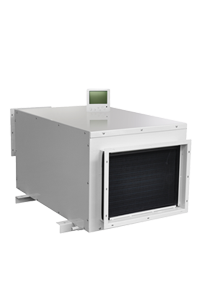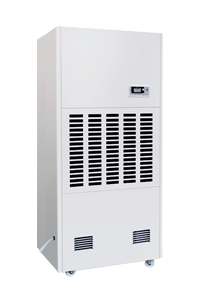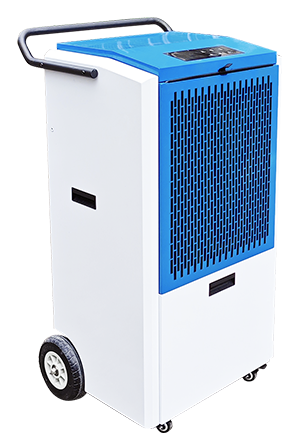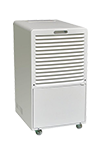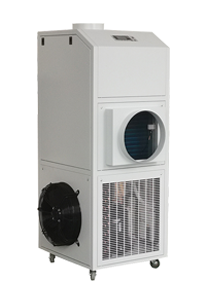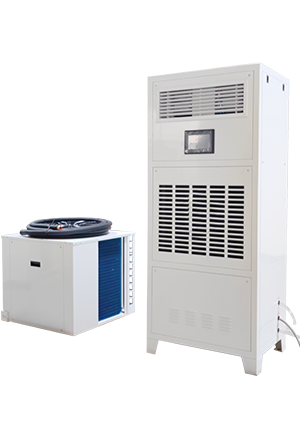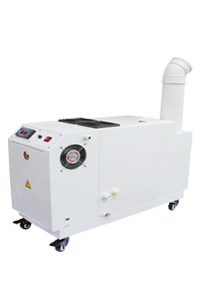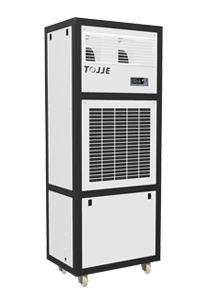Greenhouse planting
Industrial dehumidifiers play a crucial role in maintaining optimal growing conditions within greenhouses. By controlling humidity levels, they contribute to the health and productivity of the plants, as well as help in preventing the growth of harmful pathogens. Here's a detailed explanation of how industrial dehumidifiers serve as a solution in greenhouse settings:
1. Maintaining Ideal Humidity Levels:
Plants thrive in specific humidity ranges, and deviations can lead to stress, reduced growth, and susceptibility to diseases. Industrial dehumidifiers help maintain the ideal humidity levels by removing excess moisture from the air, ensuring a stable and conducive environment for plant growth.
2. Preventing Disease and Pest Infestations:
High humidity is a breeding ground for fungi, bacteria, and pests, which can cause diseases such as powdery mildew, gray mold, and root rot. By reducing humidity, industrial dehumidifiers minimize the risk of these diseases and infestations, leading to healthier plants and higher crop yields.
3. Enhancing Plant Quality and Yield:
Consistent humidity control contributes to the overall quality of the produce. It can affect the size, color, and taste of fruits and vegetables. Industrial dehumidifiers help in achieving a balance that enhances the yield and quality of the crops.
4. Reducing Energy Costs:
Greenhouses often require heating, especially in colder climates, which can increase humidity levels. Industrial dehumidifiers work in conjunction with heating systems to remove excess moisture, reducing the need for additional heating and thus lowering energy costs.
5. Supporting Climate Control Systems:
Modern greenhouses are equipped with sophisticated climate control systems. Industrial dehumidifiers integrate seamlessly with these systems, providing precise humidity control that complements temperature and ventilation management.
6. Protecting Sensitive Plants:
Some plants, such as seedlings and certain exotic species, are particularly sensitive to humidity changes. Industrial dehumidifiers provide the necessary humidity control to protect these delicate plants and ensure their survival and growth.
7. Facilitating Accurate Monitoring:
Industrial dehumidifiers often come with monitoring capabilities, allowing growers to keep a close eye on humidity levels. This data can be used to fine-tune the dehumidification process and make informed decisions about irrigation and other cultivation practices.
8. Adapting to Seasonal Changes:
Seasonal variations can significantly affect humidity levels within a greenhouse. Industrial dehumidifiers can adapt to these changes, ensuring consistent conditions year-round and allowing for year-round cultivation.
9. Ensuring Even Distribution of Humidity:
Greenhouses can have areas with varying humidity levels due to differences in temperature, light exposure, and airflow. Industrial dehumidifiers help in achieving a more uniform humidity distribution, ensuring that all plants receive the same level of care.
10. Reducing Watering Needs:
By controlling humidity, industrial dehumidifiers can also help in reducing the frequency and amount of watering required. This not only conserves water but also prevents overwatering, which can lead to root rot and other issues.
In conclusion, industrial dehumidifiers are an essential tool for greenhouse management, offering a range of benefits from disease prevention to energy savings. By selecting the appropriate dehumidifiers and integrating them into the greenhouse's climate control strategy, growers can optimize the growing environment and enhance the productivity and profitability of their operations.
1. Maintaining Ideal Humidity Levels:
Plants thrive in specific humidity ranges, and deviations can lead to stress, reduced growth, and susceptibility to diseases. Industrial dehumidifiers help maintain the ideal humidity levels by removing excess moisture from the air, ensuring a stable and conducive environment for plant growth.
2. Preventing Disease and Pest Infestations:
High humidity is a breeding ground for fungi, bacteria, and pests, which can cause diseases such as powdery mildew, gray mold, and root rot. By reducing humidity, industrial dehumidifiers minimize the risk of these diseases and infestations, leading to healthier plants and higher crop yields.
3. Enhancing Plant Quality and Yield:
Consistent humidity control contributes to the overall quality of the produce. It can affect the size, color, and taste of fruits and vegetables. Industrial dehumidifiers help in achieving a balance that enhances the yield and quality of the crops.
4. Reducing Energy Costs:
Greenhouses often require heating, especially in colder climates, which can increase humidity levels. Industrial dehumidifiers work in conjunction with heating systems to remove excess moisture, reducing the need for additional heating and thus lowering energy costs.
5. Supporting Climate Control Systems:
Modern greenhouses are equipped with sophisticated climate control systems. Industrial dehumidifiers integrate seamlessly with these systems, providing precise humidity control that complements temperature and ventilation management.
6. Protecting Sensitive Plants:
Some plants, such as seedlings and certain exotic species, are particularly sensitive to humidity changes. Industrial dehumidifiers provide the necessary humidity control to protect these delicate plants and ensure their survival and growth.
7. Facilitating Accurate Monitoring:
Industrial dehumidifiers often come with monitoring capabilities, allowing growers to keep a close eye on humidity levels. This data can be used to fine-tune the dehumidification process and make informed decisions about irrigation and other cultivation practices.
8. Adapting to Seasonal Changes:
Seasonal variations can significantly affect humidity levels within a greenhouse. Industrial dehumidifiers can adapt to these changes, ensuring consistent conditions year-round and allowing for year-round cultivation.
9. Ensuring Even Distribution of Humidity:
Greenhouses can have areas with varying humidity levels due to differences in temperature, light exposure, and airflow. Industrial dehumidifiers help in achieving a more uniform humidity distribution, ensuring that all plants receive the same level of care.
10. Reducing Watering Needs:
By controlling humidity, industrial dehumidifiers can also help in reducing the frequency and amount of watering required. This not only conserves water but also prevents overwatering, which can lead to root rot and other issues.
In conclusion, industrial dehumidifiers are an essential tool for greenhouse management, offering a range of benefits from disease prevention to energy savings. By selecting the appropriate dehumidifiers and integrating them into the greenhouse's climate control strategy, growers can optimize the growing environment and enhance the productivity and profitability of their operations.

